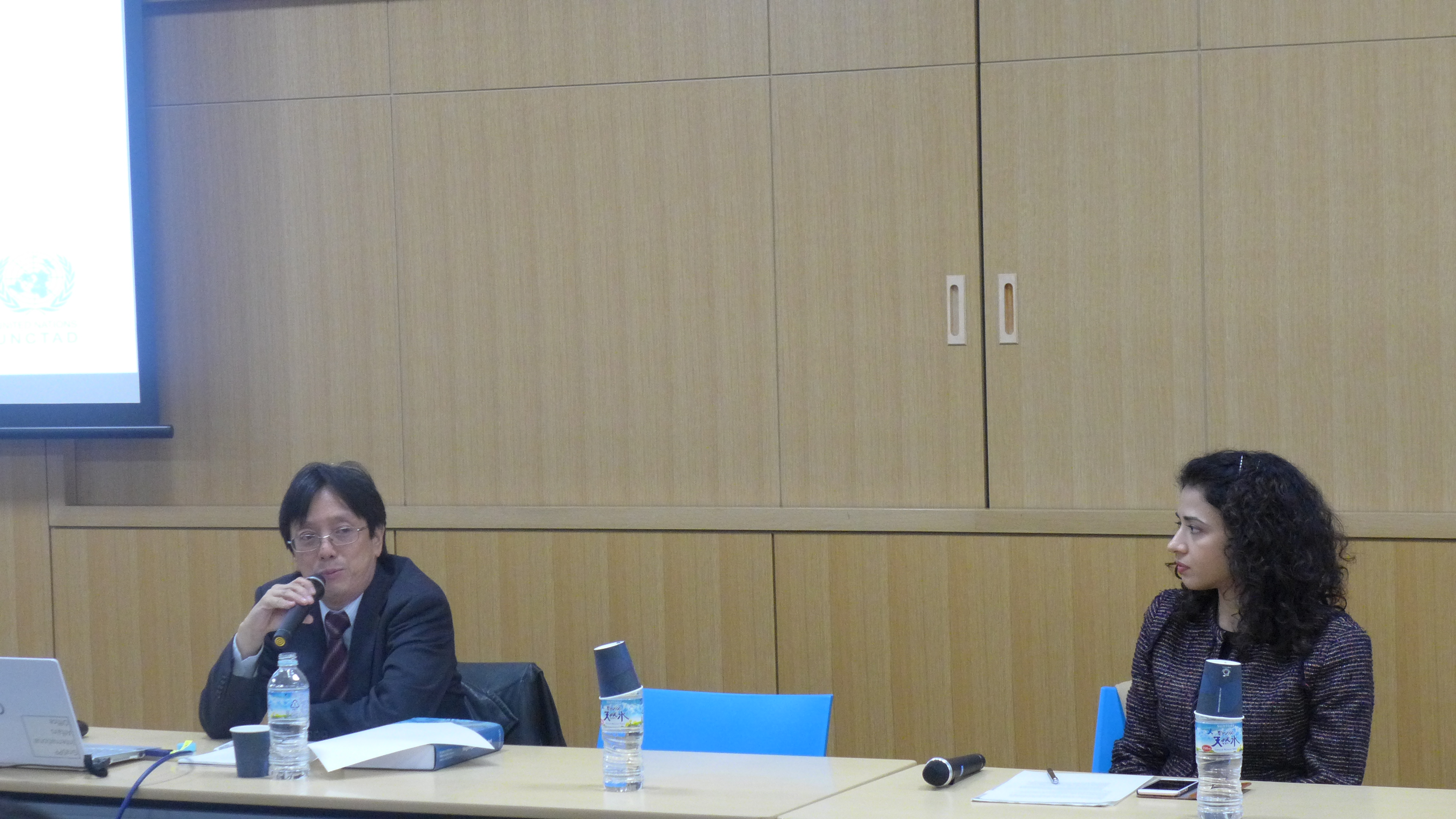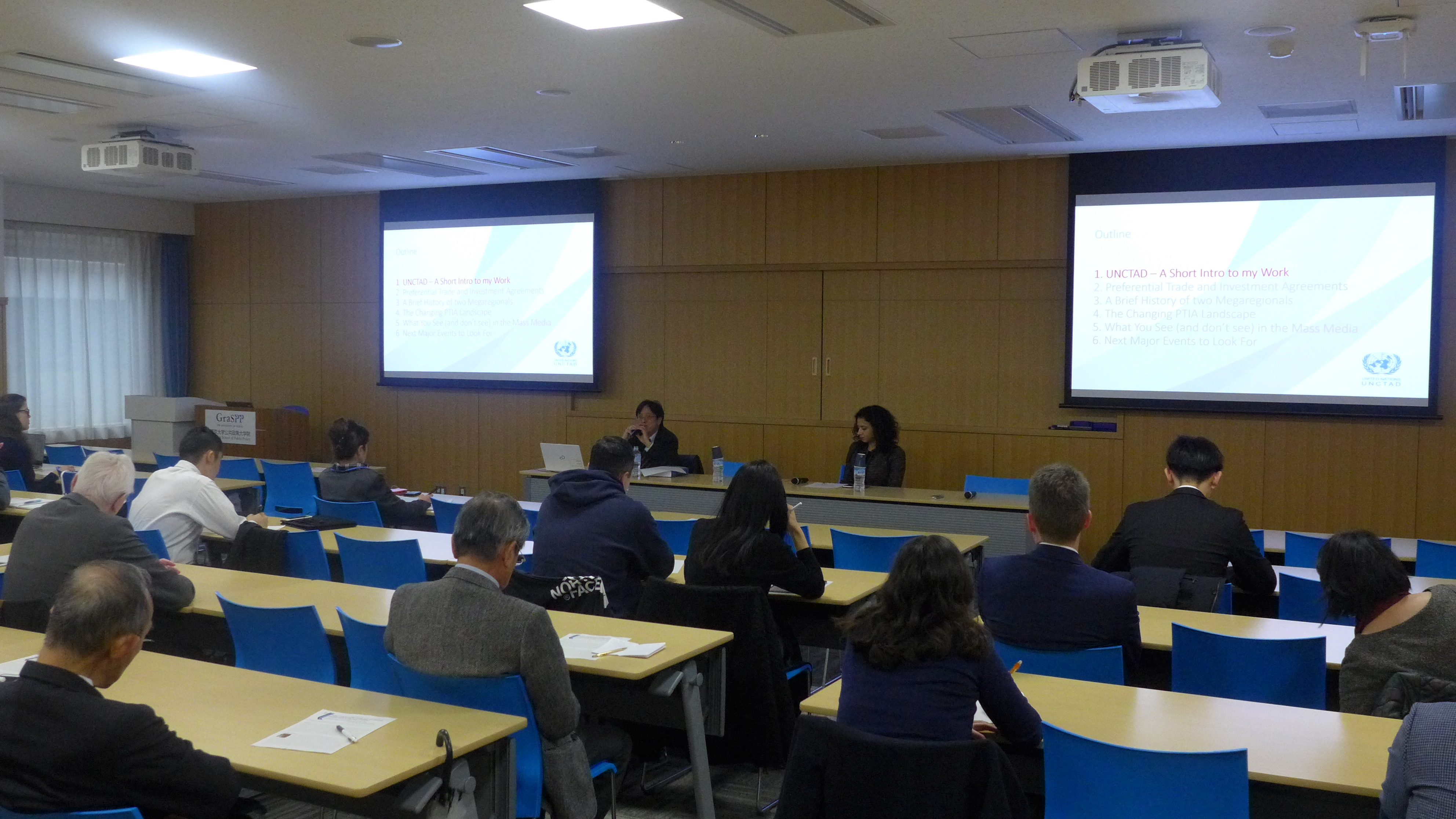SSUフォーラム/GraSPPリサーチセミナー “Asia’s Preferential Trade and Investment Partnerships in the post-TPP Era”
-
日程:2019年11月27日(水)
-
時間:10:30 - 12:00
-
会場:東京大学本郷キャンパス 国際学術研究棟4F SMBCアカデミアホール
MAP -
題目:
“Asia’s Preferential Trade and Investment Partnerships in the post-TPP Era”
-
言語:
英語
-
定員:
80名
-
主催:
東京大学未来ビジョン研究センター安全保障研究ユニット
GraSPPリサーチセミナー
未来ビジョン研究センターとGraSPPリサーチセミナーは、今後の活動についての情報を提供するため皆様の個人情報を収集させていただいております。
この情報はいかなる第三者にも開示致しません。
安達 潔 国連貿易開発会議(UNCTAD) 知的財産チームリーガルオフィサー、GRIPS客員研究員
The changes in the Trans-Pacific Partnership Agreement (TPP) made in order to agree to the Comprehensive and Progressive Agreement for Trans-Pacific Partnership (CPTPP) reflect the demands of many of the developing countries involved in the negotiations to remain committed to the treaty, given the withdrawal of the United States from the former in early 2017. Most of those changes were the ‘suspension’ of many, but certainly not all, of the provisions that deal with intellectual property and technology transfer. While the expansion of the CPTPP remains a cornerstone of Japanese foreign policy in Asia, the efforts to enlarge the geographical scope of the treaty takes place amidst the negotiation of other large, plurilateral (or ‘megaregional’) economic agreements such as the Regional Comprehensive Partnership Agreement (RCEP), China’s ‘One Belt One Road’ initiative, as well as important bilateral trade negotiations between the US and, respectively, China and Japan. Given the rapidly changing geopolitical landscape in Asia, countries that have not signed on to the CPTPP are scrutinizing the costs and benefits of joining the treaty, and weighing all of their options.
Kiyoshi Adachi is a Legal Officer of the Intellectual Property Unit, Division on Investment and Enterprise, United Nations Conference on Trade and Development (UNCTAD) and a visiting scholar at the National Graduate Institute for Policy Studies in Tokyo. Since 2006, Mr. Adachi has led a team of lawyers at UNCTAD looking into the integrated treatment of intellectual property, technology transfer and development issues, and has published and lectured widely on this interface. He has advised and trained stakeholders in developing countries in Asia and Africa on intellectual property provisions in preferential trade and investment agreements; intellectual property and local manufacturing of/access to medicines; and the relationship between intellectual property and access and benefit sharing policies under the Convention on Biological Diversity. Prior to joining UNCTAD, he worked with the United Nations in New York and Vienna, and with an international law firm in Tokyo. Mr. Adachi holds a Juris Doctor from the UCLA School of Law and is admitted to the bars of Pennsylvania and the District of Columbia, USA. He also has a Master of Public Administration from the American University and a Bachelor’s degree in Government and Asian Studies from Dartmouth College.
未来ビジョン研究センター安全保障ユニット(SSU)は、公共政策大学院との共催により、国連貿易開発会議(UNCTAD)知的財産課法務官の安達潔氏を招いての講演会を開催しました。
講演会の初めに、司会を務めるIFIナジア・フサイン特任助教が講演者を紹介しました。

安達氏は、UNCTADと知的財産課の概要について紹介した後、最近協議が行われている2つの特恵貿易投資協定である、環太平洋パートナーシップに関する包括的で先進的な協定(CPTPP)および、地域包括的経済連携(RCEP)の交渉過程について説明した。TPP / CPTPPに関しては、2017年初めに米国がTPPから離脱した後、開発途上国の参加によってCPTPPの最終文書に関する合意に達した際には、多くの知的財産に関する項目を保留する必要があったことが指摘されました。現時点で、最終文書に署名した途上国のうち4カ国がまだCPTTPを批准していません。RCEPに関する協議も困難に直面しており、2019年11月には、医薬品へのアクセスといった分野等において受ける影響を懸念して、インドが協議から離脱すると決定しました。これらの協定の最近の動向は、多国間条約によって幅広い課題を取り扱う「メガレギュレーション」が注目される一方、その実現は必然的でも容易でもないことを示しています。さらに、近年では以前に比べて特恵貿易投資協定があまり締結されておらず、報復関税や投資に対する国内規制が増加している状況の中で協議が行われていることも困難を増幅させています。

タイの事例を示しながら、安達氏はCPTPPの締約国になることに国内での合意を得ることがいかに難しいかを説明しました。政府の省庁間にも、国内の様々な立場の人々の間にも、意見の相違があります。学生、研究者、実務家のみなさんには、多様な国内世論が必ずしもすべてメディアで報道されているわけではないことに留意してほしいと述べて、安達氏は講演を締めくくりました。
※本フォーラムは、当センターが委託を受けた外務省外交・安全保障調査研究補助金事業と関連したテーマで開催されたものです。